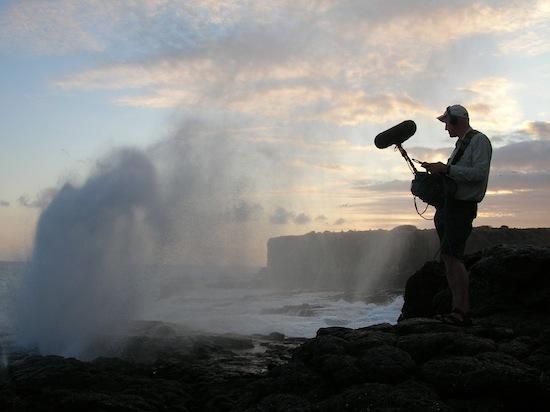On Armistice weekend this year Newcastle’s historic Boiler Shop venue will host a series of performances by artists marking the centenary of the end of the First World War in 1918. British Sea Power, Darren Hayman, Richard Dawson, Bas Jan and Shirley Collins will all play live, and at the core of the commemorations will be a new work by Chris Watson. Called A Nightingale on the Western Front, it will be a durational piece that begins before dawn at 5:30 am, continuing into the daylight of the 11th day of the 11th month. This will be followed by a Q&A between Watson and tQ’s Luke Turner, and followed by an afternoon gig by Richard Dawson. For more information please visit the Boiler Shop website and buy tickets here. Below, Chris Watson discusses the A Nightingale on the Western Front work.
How did A Nightingale on the Western Front come about?
Chris Watson: David from the Boiler Shop in Newcastle asked me if I’d be interested in project to commemorate the end of the First World War. We thought about the sound of the place where there are thousands of people, mostly young men, still in the soil. They went there from fifty different nationalities to defend whatever story they were told. Most likely they were there to preserve what they thought was a way of life, their perspective of ‘countryside’, as well as the nationalistic aspect of it. But they’re all now together in a place which has paradoxically become a landscape somewhat like the places I imagine they would have dreamed about going home to, because so many were from rural backgrounds.
I went out last winter and made a whole series of recordings in the woodlands and forests that are now on the battlefields. One place that’s now a nature reserve, was absolute carnage a hundred years ago. I made recordings through the night, and through the day, with this very deep quality of stillness and quietness, over long periods of time. And then I went back in the spring, to record a dawn chorus involving this place coming back to life. So I made a piece that I’m going to do a live diffusion of across sunrise on November 11th, so from five in the morning, diffusing the sounds of that place where those young men still lie. This sense of darkness into light and winter into spring is an elegy for them, and where they are now, and what it has become, which is, as I said, strangely a place that a lot of them had ties with.
Both sides used this idealised countryside as a propaganda tool, telling conscripts and volunteers that they were defending this special English way of life
CW: Yes, the Germans did too, using that mythical idea of the countryside. There’s a lot of the poetry and writing and prose from both sides about that, about how that habitat was decimated. Of course, it has now returned, wildlife very quickly responds to places and returns. Birds are now singing on the branches of trees under which these people are still buried.
So this is the striking thing. We read accounts of battles, and particularly skylarks are something people – soldiers – mentioned. There would just be complete hell around them, and machine gun fire, but the skylarks would still be singing. It’s often used in novels, and in films.
CW: Yeah. And nightingales nested in the trenches, inhabiting this man-made hell. These species don’t recognise the landscape in the same way as we do, and they’ll faithfully return to places where they hatched as an egg the year before. And a hundred years between is the blink of an eye, in terms of evolution. A lot of those birds that were there when I recorded earlier this year will be genetically related to the birds that were there a century ago.
A Nightingale on the Western Front will be taking place in the Boiler Shop, which is an incredible venue in Newcastle where the Stephenson family made locomotives and munitions, that’s another interesting aspect isn’t it. The installation will be in a place where they made weapons of war.
CW: I enjoy doing these durational pieces. So you go in, and you give two and a half hours, and it’ll start in darkness, and it’s quite cold because it’s unheated, and then there’ll be light coming in from outside, and you’ll gradually hear the change, over two and a half hours, from winter into spring, darkness into light and the changing of the seasons.


